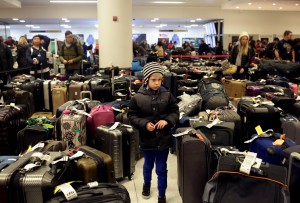This piece is by Janet Stanton, Partner, Adam Smith, Esq.
Shortly after the New Year, a powerful winter storm marched up the East Coast. While certainly a very serious storm, Grayson, as it was named, was far from the worst or most damaging. New York got about 10” of the white stuff (compared to the nearly 27” from its largest storm in 2006). Boston picked up a bit more than 13” of snow (compared to the 27” dumped on them 15 years ago). Transportation was, of course, a complete mess; airports were forced to close, cancelling countless flights and trapping thousands of passengers.
But what ensued at Logan and Kennedy could not have been more different. After being closed for a day, Logan reopened and operated normally. Not so at Kennedy.
Kennedy rapidly descended into Kafkaesque chaos. The airport was already jammed with planes that had been grounded by the storm. Incoming flights kept landing and were directed to unused runways now serving as parking lots with the many other planes waiting for access to gates. Weary, bleary, frustrated travelers spent hours on planes on the tarmac or camping as best they could in crowded terminals. Luggage took hours to appear and, in some cases, bags weren’t returned until weeks later. Truly a nightmare. As long as three days after the pile-up it was not clear who had the authority to stop the planes from coming in.
Rick Cotton, executive director of the Port Authority of New York and New Jersey, which operates Kennedy (and LaGuardia and Newark Liberty airports) blamed inadequate technology as the primary culprit. Could be plausible, considering the shambolic state of our infrastructure, in general and the NY metro airports, in particular. But then do we suppose that Logan is significantly more tech savvy? Nope, that wasn’t it.
Turns out Logan and Kennedy are managed in entirely different ways. In an insightful article in The New York Times, Patrick McGeehan reports on why the experiences and outcomes at these two major Northeast airports were so dissimilar.
McGeehan writes, “At Logan, the Massachusetts Port Authority, known as Massport, maintains near-complete control; at Kennedy, the Port Authority of New York and New Jersey has shifted much of the management of its terminals to airlines and other private companies, leaving the bulk of the responsibility for dealing with emergencies out of the agency’s hands.”
At Logan, everyone knows who’s in charge (turns out to be Ed Freni, director of aviation at Massport) and there is a daily meeting of all the airport constituents and competitors (representatives from the airlines and state and local officials) to share information on what might impact operations and how to respond.
Compare this to Kennedy, where everything that takes place in the six terminals is left to the tenants of these terminals. Terminal 1, alone, has 21 foreign airlines. What could possibly go wrong? Once the airport reopened, the airlines each scrambled to get their flights to Kennedy, swamping the managers of the terminal’s 11 gates. Pandemonium ensued.
Now, dear readers, I ask you which airport, Logan or Kennedy have a management structure closer to that of many law firms? And, what will you do when the next snow storm looms? Praying it will never snow in the Northeast doesn’t seem like much of a plan.



